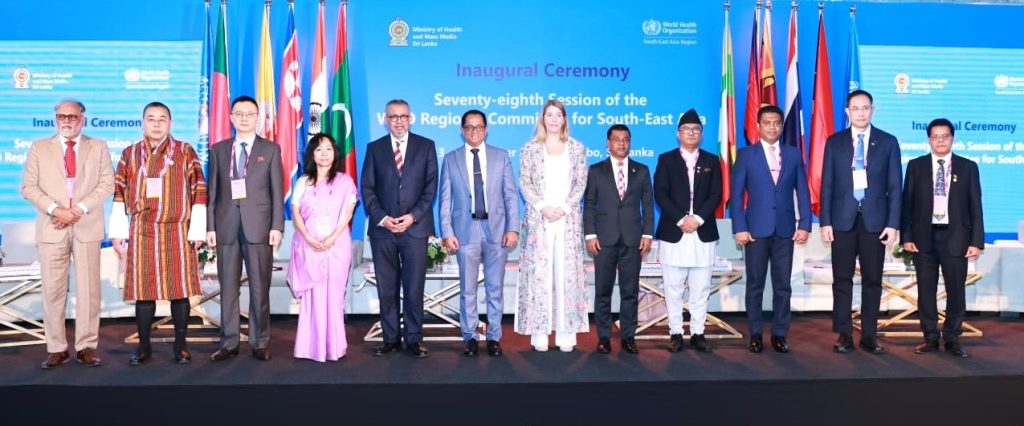78th WHO South-East Asia Regional Committee Session Begins in Colombo

78th WHO South-East Asia Regional Committee Session Commences in Colombo: Focus on Health Cooperation and Policy Frameworks
(Source: WHO SEARO, October 2025)
Introduction
The 78th Session of the World Health Organization (WHO) Regional Committee for South-East Asia (SEARO) commenced in Colombo, Sri Lanka, bringing together ministers, health experts, and senior policymakers from across the region to deliberate on pressing health priorities and regional cooperation. The session serves as a crucial platform for aligning national health strategies with WHO’s regional and global objectives, particularly in the context of Universal Health Coverage (UHC) and resilient health systems.India’s Minister of State for Health, Anupriya Patel, is participating in the session, reaffirming India’s leadership role in advancing regional collaboration and strengthening institutional mechanisms to tackle shared public health challenges.
I. Background and Context
The WHO South-East Asia Region, comprising 11 member states, represents nearly a quarter of the world’s population and continues to face multiple health challenges — including emerging infectious diseases, non-communicable diseases (NCDs), antimicrobial resistance (AMR), and climate-linked health threats.The Regional Committee Session, the highest policy-making body for the SEARO region, is held annually to evaluate progress, set new priorities, and adopt resolutions to guide member states in health policy implementation. The 78th session in 2025 is of particular significance as it takes place amid efforts to consolidate pandemic recovery, reinforce health system resilience, and implement the WHO’s “Health for All” vision aligned with the Sustainable Development Goals (SDG 3).
II. Key Agendas and Themes of the Session
- Promoting Healthy Ageing through Primary Healthcare
- The session will discuss policies to strengthen primary healthcare systems as the foundation for healthy ageing.
- With populations ageing rapidly across Asia, WHO emphasizes community-based, preventive, and long-term care models to support healthy longevity.
- Curbing Tobacco Consumption
- Tobacco use remains one of the leading preventable causes of death in the region.
- The session aims to reaffirm commitments under the WHO Framework Convention on Tobacco Control (FCTC) and explore fiscal and regulatory measures to reduce tobacco dependence.
- Expanding the Regional Health Emergency Fund (RHEF)
- Given the lessons from the COVID-19 pandemic and regional disease outbreaks, member states will deliberate on expanding and institutionalizing the RHEF to ensure rapid mobilization of resources during health emergencies.
- The fund seeks to strengthen epidemic preparedness, surveillance, and cross-border cooperation.
- Addressing Antimicrobial Resistance (AMR)
- AMR continues to threaten global health security. The session focuses on implementing One Health-based frameworks, ensuring responsible antibiotic use, and scaling up national AMR action plans.
- Adoption of Key Resolutions
- The committee is expected to adopt resolutions on health workforce capacity building, digital health transformation, and financing models for equitable healthcare access across the SEARO region.
III. Leadership and Participation
- WHO Director-General Dr. Tedros Adhanom Ghebreyesus and Regional Director for South-East Asia Dr. Catharina Boehme are attending the session alongside senior officials from eight member countries.
- The event underscores the regional solidarity approach, where collective decision-making and shared knowledge contribute to health system strengthening.
- India’s participation, led by Anupriya Patel, signifies New Delhi’s continued commitment to advancing regional health diplomacy, supporting smaller nations through technical and financial collaboration, and promoting south-south cooperation.
IV. India’s Role and Strategic Importance
- Leadership in Regional Health Initiatives:
- India’s contribution to vaccine production, pandemic management, and digital health infrastructure has reinforced its role as a regional health hub.
- India continues to support capacity-building programmes, disease surveillance networks, and medical technology transfers within SEARO.
- Health Diplomacy and Cooperation:
- Through initiatives such as Ayushman Bharat Digital Mission (ABDM), eSanjeevani Telemedicine, and Digital Public Infrastructure, India provides models for scalable, inclusive health systems adaptable to diverse economies.
- Alignment with WHO’s Priorities:
- India’s domestic agenda — focusing on universal health access, immunization coverage, and primary healthcare strengthening — aligns closely with WHO’s regional priorities, amplifying its influence in shaping collective health policies.
V. Analytical Perspective
The 78th session comes at a pivotal time when the South-East Asia Region is redefining its public health architecture to meet both traditional and emerging challenges.
- The region must balance disease-specific interventions with health system strengthening, ensuring sustainability and equity.
- Strengthened regional collaboration can mitigate health inequities and foster collective preparedness against pandemics and climate-induced health crises.
- The emphasis on healthy ageing and AMR control marks a shift from reactive to preventive and holistic healthcare strategies.
VI. Implications for Global and Regional Health Governance
- For WHO SEARO: The outcomes from Colombo will likely influence the Regional Health Policy 2026–2031, establishing new frameworks for resilience and innovation.
- For India: Active participation reinforces its stature as a policy influencer and technical partner in global health governance.
- For the Global South: The SEARO model demonstrates how regional solidarity can complement global efforts toward achieving the 2030 health agenda.
Conclusion
The 78th WHO South-East Asia Regional Committee Session in Colombo marks a significant step toward reinforcing regional solidarity in public health governance. The focus on healthy ageing, AMR, and emergency preparedness demonstrates a pragmatic shift toward long-term resilience and inclusivity.India’s active participation reaffirms its leadership in shaping the regional health agenda, underscoring the importance of collaborative frameworks and sustainable health diplomacy in achieving equitable health outcomes across South and South-East Asia.
Updated - October 13, 2025 3:25 PM | News One Air